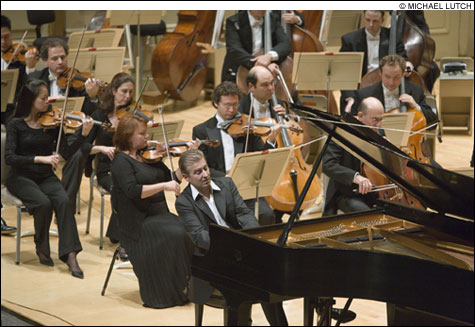
LOOKING LIKE JEAN-PAUL BELMONDO with his big open collar, Jean-Yves Thibaudet was
likewise a good influence in Ravel’s jazzy, wistful Piano Concerto in G.
|
“Ici on parle français” was the watchword at the BSO’s 2007 “Opening Night at Symphony” last evening, an “all-Ravel program,” and the two guests, American mezzo-soprano Susan Graham and French pianist Jean-Yves Thibaudet, certainly did. The vocal selection was Shéhérazade, Ravel’s setting of three poems by his homosexual friend Tristan Klingsor (né Léon Leclère): “Asie,” in which the poet longs to visit the exotic East; “La flûte enchantée,” in which, as his master sleeps, he hears the flute being played by his beloved outside; and “L’indifférent,” in which a stranger with eyes as soft as a girl’s passes by his door but doesn’t choose to enter. Wearing a high-waisted gown of tangerine, lemon, and lime that iridesced as she moved, the New Mexico–born Graham sang this trio with a precision that did full justice to la belle langue — it wasn’t just good French, it was beautiful French — and her guttural, sultry splendor left the gender of the yearning irrelevant. She made phrases melt: “Avec un personnage au milieu d’un verger” (“With a figure in the midst of an orchard”) in “Asie,” “Par ta démarche feminine et lasse . . . ” (“By your feminine and indolent walk . . . ”) in “L’indifférent.” Better yet, her example spread to BSO music director James Levine and the orchestra, who were not only lasse but also insouciant and insinuant. What they were not always was tranquille; too many of Graham’s vocal nuances were covered. Thibaudet was likewise a good influence in Ravel’s jazzy, wistful Piano Concerto in G. Tall and a little gawky, he looked like Jean-Paul Belmondo with his big, open collar, and he hovered over the piano like restaurant critic Anton Ego in Ratatouille. The first movement conjures George Gershwin and Carnaval, the second chestnut trees in smoky autumn. Thibaudet’s forthright tempi were tempered by a softness of touch; more weight and more sensuousness would have been welcome, however, and in the slow movement more autumn, more regret. The passagework at the end of this movement, where the pianist accompanies a solo cor anglais, was backward to a fault — it’s the piano that has the pulse points of the harmonic changes. The third movement is a side-splitting fox hunt, the horns calling, the piano and the orchestra galloping, and everyone running into dead ends as the fox scurries away. Here the hunters galloped for all they were worth, and their reward was the glory of the chase.
The rest of the program was less rewarding. Levine opened with Alborada del gracioso and closed with the Suite No. 2 from Daphnis et Chloé, and the exquisite solos and an à propos sense of brooding were offset by vulgar, earsplitting climaxes and no sense of direction. It’s true that, listening to conductors as varied as Bernard Haitink and Rafael Frühbeck de Burgos (live) and Charles Munch and Claudio Abbado (recorded), I’ve never been able to hear much direction in Daphnis et Chloé. I’d have been just as happy if they’d dispensed with that one and given us encores from Graham and Thibaudet.
This evening (October 5) and tomorrow evening (October 6), James Levine and the Boston Symphony Orchestra will perform a slightly different Ravel program: Alborada del gracioso; Pavane pour une infante défunte; Piano Concerto in G, with Jean-Yves Thibaudet, and Daphnis et Chloé (complete). Susan Graham’s performance of Shéhérazade, with Yan Pascal Tortelier and the BBC Symphony Orchestra, is on the Warner CD Poèmes d’amour; Jean-Yves Thibaudet’s performance of the Piano Concerto in G, with Charles Dutoit and the Montreal Symphony Orchestra, is on a Decca CD.
 Related
Related:
Cornucopia, Schnozzola!, From Berlioz to Bayadère, More 
- Cornucopia
The year 2007 didn’t begin on the highest note.
- Schnozzola!
By the time you read this, you've either seen or missed one of Boston's most exciting opera productions, Opera Boston's brilliant version of Shostakovich's The Nose .
- From Berlioz to Bayadère
The czy ambiance at Symphony Hall made the announcement of the Boston Symphony Orchestra’s 2007–2008 season seem like a family chat with James Levine.
- World music
There’s more to Boston’s classical music scene than the Boston Symphony Orchestra.
- Opening nightmare
It wasn’t as bad as what happened at Opening Night at the Pops last May, but it was still awful.
- Beyond the fringe
It was a good week for chamber opera: Bluebeard’s Castle from the BSO, Curlew River from Intermezzo.
- Hail and farewell
The season’s most eagerly awaited (and, with its $187 top ticket price, most expensive) classical concert was not a disappointment.
- Mixed blessings
The Boston Symphony Orchestra began the new year with one of its most disappointing concerts since music director James Levine took over.
- Granduer and intimacy
One of the most delightful moments in Mozart comes at the very end of his Symphony No. 39 in E-flat, the first of his last trio of great symphonies.
- Pilgrimage
Charles Ives's Fourth Symphony is a stunner. And Boston Symphony Orchestra guest conductor Alan Gilbert, the New York Philharmonic's music director designate led a stunning performance.
- Variety show
James Levine completed his second season as the Boston Symphony Orchestra’s music director with another riveting though not-quite polished evening of Schoenberg and Beethoven.
- Less

 Topics
Topics:
Music Features
, Entertainment, Music, Classical Music, More  , Entertainment, Music, Classical Music, Orchestral Music, Media, James Levine, Bernard Haitink, Poetry, Boston Symphony Orchestra, George Gershwin, Less
, Entertainment, Music, Classical Music, Orchestral Music, Media, James Levine, Bernard Haitink, Poetry, Boston Symphony Orchestra, George Gershwin, Less 